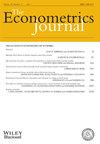不假设平均平稳性的识别:具有内生回归因子的动态面板模型的准极大似然估计
IF 2.9
4区 经济学
Q1 ECONOMICS
引用次数: 2
摘要
当数据具有高度持久性时,具有预定或内生回归的动态面板模型的线性广义矩方法(GMM)估计量会遇到弱工具问题。在本文中,我们为这类模型提出了新的随机和固定效应有限信息拟最大似然估计量(LIQMLE)。我们还讨论了包含时变个体效应的模型的LIQMLE。与系统GMM估计不同,LIQMLE不需要一致性的平均平稳性条件。这样的条件通常不适用于我们所考虑的模型。我们的LIQMLE基于两步控制函数方法,该方法包括结果方程中预定或内生回归的第一阶段模型残差。LIMLE比基于原始结果方程的非线性GMM估计量更精确。LIQMLE在精度、稳健性和/或易于计算方面也优于各种替代(准)最大似然估计量。本文章由计算机程序翻译,如有差异,请以英文原文为准。
Identification without assuming mean stationarity: quasi–maximum likelihood estimation of dynamic panel models with endogenous regressors
Linear generalised method of moments (GMM) estimators for dynamic panel models with predetermined or endogenous regressors suffer from a weak instruments problem when the data are highly persistent. In this paper, we propose new random- and fixed-effects limited-information quasi–maximum likelihood estimators (LIQMLEs) for such models. We also discuss LIQMLEs for models that contain time-varying individual effects. Unlike system GMM estimators, the LIQMLEs do not require mean stationarity conditions for consistency. Such conditions often do not hold for the models we consider. Our LIQMLEs are based on a two-step control function approach that includes the first-stage model residuals for a predetermined or endogenous regressor in the outcome equation. The LIMLEs are more precise than nonlinear GMM estimators that are based on the original outcome equation. The LIQMLEs also compare favourably to various alternative (quasi–) maximum likelihood estimators in terms of precision, robustness, and/or ease of computation.
求助全文
通过发布文献求助,成功后即可免费获取论文全文。
去求助
来源期刊

Econometrics Journal
管理科学-数学跨学科应用
CiteScore
4.20
自引率
5.30%
发文量
25
审稿时长
>12 weeks
期刊介绍:
The Econometrics Journal was established in 1998 by the Royal Economic Society with the aim of creating a top international field journal for the publication of econometric research with a standard of intellectual rigour and academic standing similar to those of the pre-existing top field journals in econometrics. The Econometrics Journal is committed to publishing first-class papers in macro-, micro- and financial econometrics. It is a general journal for econometric research open to all areas of econometrics, whether applied, computational, methodological or theoretical contributions.
 求助内容:
求助内容: 应助结果提醒方式:
应助结果提醒方式:


